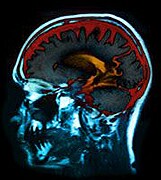
MONDAY, Jan. 9 (HealthDay News) — A new study finds that an active lifestyle may help protect against Alzheimer’s-related brain changes in people who have a well-known genetic risk factor. This factor is the e4 allele (version) of the apolipoprotein E (APOE) gene.
“The presence of an APOE e4 allele is the most established genetic risk factor for Alzheimer disease, with a higher percentage of individuals with Alzheimer’s disease having an e4 allele in comparison with the general population,” the authors write in the article published online Jan. 9 in the journal Archives of Neurology.
It’s been suggested that the presence or absence of this gene variant might affect the relationship “between lifestyle factors such as exercise engagement and risk of cognitive decline and dementia,” added researcher Denise Head and colleagues at Washington University, St. Louis.
They examined the association between exercise and amyloid deposits in the brain among 201 cognitively normal patients, ages 45 to 88, with and without the APOE e4 allele.
Deposits of amyloid protein in the brain have long been associated with Alzheimer’s disease.
Patients with an active lifestyle had less cerebral amyloid deposition than those with a sedentary lifestyle, the study found.
The researchers conclude that the presence of the APOE e4 gene “is associated with increased risk of cognitive decline and elevated amyloid deposition.” But they add that, “exercise engagement has been associated with reduced risk of cognitive decline and lower levels of amyloid deposition.”
“In summary, our findings suggest that exercise at levels recommended by the AHA [American Heart Association] may be particularly beneficial in reducing the risk of brain amyloid deposition in cognitively normal e4-positive individuals,” they concluded.
More information
The Alzheimer’s Association has more about Alzheimer’s disease.

